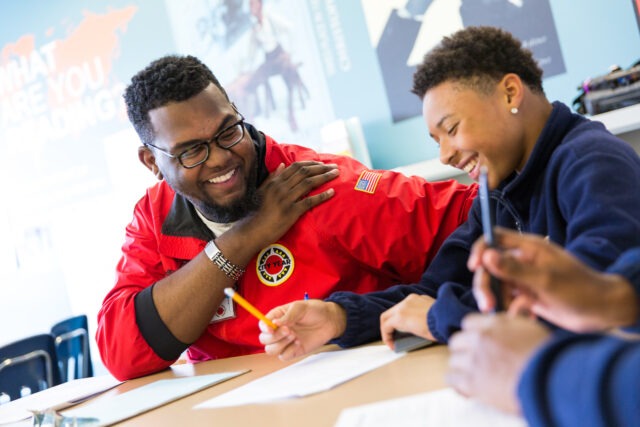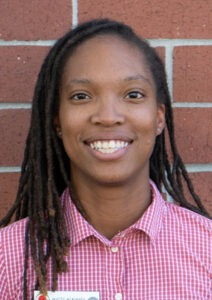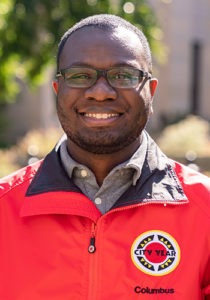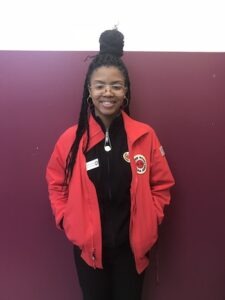City Year offers caring, consistent student support
The current school year marks the third affected by the COVID-19 pandemic. Since March 2020, City Year AmeriCorps members and school-based staff have found innovative ways to continue supporting our students and communities through collaboration and creating a sense of belonging within their teams and schools.
We caught up with Impact Manager Ileesha White and Impact Director La’Rez Wilson from City Year Columbus and Interim Executive Director Macey Amissah-McKinney from City Year Sacramento as they shared their reflections.

Talking about COVID-19 with students
It’s important to have honest conversations about the pandemic with students to ensure everyone is part of a healthy school environment. Although conversations surrounding COVID-19 can feel daunting, Macey Amissah-McKinney advises that AmeriCorps members can help keep it simple for students through establishing routines, such as wearing masks properly and hand washing.
While corps members, teachers and school administrators are partners in ensuring a safe school environment, IIeesha White notes that students often keep each other accountable. Students are also experiencing the effects of the pandemic from worrying about their own health to losing a loved one to COVID-19.
“We lost a teacher to COVID,” White said. “She’d been at our school for over 30 years and taught several generations of families.”
Students may occasionally need to be reminded to pull their mask over their nose, but they understand the importance of keeping each other safe. Providing students with a welcoming school environment, a feeling of safety and belonging, and giving them the space to process their feelings all help students to adjust to the disruptions, loss and change that have happened during the pandemic.
The importance of consistent social-emotional support
Schools and educators have had to re-imagine what it means to have a normal school year.
“As schools have had to combine classes, rotate students to other teachers, and deal with a lot of substitute teachers, our corps members have been providing additional capacity and consistency,” said Amissah-McKinney. “City Year Sacramento has been able to remain focused on bringing in some of those engagement opportunities that just kind of make school continue to feel as normal, or close to normal as possible.”
Part of creating this sense of normalcy for students is making spaces for fun and being open to new ways of engagement. City Year AmeriCorps members, who serve in schools full-time as student success coaches, receive training and support before and during the school year. They learn how to build positive relationships with students over time and provide academic, social and emotional supports that help students to build confidence, recover from setbacks, set and achieve goals, and reach their full potential.
In virtual spaces, corps members can check in with their students through private chat or following up with them after class. City Year Director of National Math Programs Kristen Olmsted emphasizes the importance of this outreach work because it tells students: “I see you. I notice you. I might not have heard from you today, but I wanted you to know that I’m here in whatever way you need me to be.”
When students feel seen, even in a virtual classroom, Olmsted says, “it builds the relationship and trust so when students do feel comfortable, they know who to reach out to and are willing to reach out.”
La’Rez Wilson recalls a conversation with one student who expressed that he was excited for school to reopen after months of virtual classes because he wanted to personally thank AmeriCorps members for supporting him.
“He wanted to look for them and share his gratitude and appreciation for just being there,” Wilson said.
City Year strives to make time for fun and joy at school
Fun and joy in schools can be overlooked, but they’re important parts of the school environment.
Even with masks and social distancing protocols, schools and corps members are making fun spaces through structured activities. In some cases, City Year corps members and staff are prioritizing games and activities even more than they did before COVID, recognizing they can help students relax and reconnect with their school community—factors that help students become ready to learn and re-engage with their classes.
“Although games may be different than playing tag or kickball due to the need to maintain social distancing, we’ve been able to get creative in these spaces,” Amissah-McKinney says. “One school had chalk art on the blacktop. Kids were spread out and still having fun and this wasn’t necessarily something students were doing before the pandemic.”
Prior to the pandemic it was common for recess to remain relatively short and indoors in many schools. Incorporating more outside time has been shown to be beneficial for boosting students’ social-emotional health.
White’s team in Columbus set up mood boards in the school gym that feature giant cut-outs of popular rap artists. It’s a fun way for students to “gauge where they are or how the school is doing as a whole,” she said.
Along with the mood board, students can leave positive sticky notes for each other and take a positive note they need.
“This year, Columbus schools are leaning into what it means to promote self-care for our staff and students,” White says, “which is really great because the topic of mental health has been neglected for so long.”
To initiate this conversation on self-care, White’s team posted QR codes throughout the school that students can scan to connect with mental health resources.
Building a sense of belonging among the corps
Before she became an impact manager at Linden McKinley STEM Academy in Columbus, White served as an AmeriCorps member and then as a team leader at City Year Columbus.
Now in her third school year serving at the same school, White recognizes first-hand the importance of consistent holistic support for students—not only academic but also social and emotional as all three are key parts of learning and development. She understands how committed corps members, serving as students success coaches, can be in their work with students. As an impact manger she wants to make space for her own team of corps members to take care of themselves and build a sense of community with each other.
White bought her team journals and created a self-care calendar filled with fun prompts and questions. During one prompt, it was revealed that AmeriCorps member Aaron Tayal is a talented artist. A student who walked into the office and saw Tayal’s drawing asked: “Mr. Aaron can you draw my dog?”
These prompts have encouraged corps members to reflect, have fun and get to know each other. White’s intention behind these journal prompt “is giving them a space to build more belonging with one another.” When corps members build community among each other they create a support system and a culture of care that students can model.
City Year strives to create a culture of community care and this not only means being intentional about creating a sense of belonging but also supporting immediate needs of corps members. Several sites are supporting corps members by providing food pantries. In City Year Sacramento staff have helped deliver food to corps members in need.
The same kinds of supports students need to thrive—consistent connections with caring adults; a sense of safety and belonging; a recognition of our complex needs as people, including a renewed emphasis on mental health and well-being—are the very same things that City Year AmeriCorps members need to show up for their students, their teammates and themselves, as they continue to learn and grow.
When we build a community it is important to ask the question: how are we doing? As an impact director in Columbus, La’Rez Wilson leads a team of impact managers like Ileesha White. When meeting his team of impact managers, Wilson starts meetings with icebreaker questions to get to know people on a deeper level. He hopes that as a leader who continuously builds relationships with his team, they are in turn empowered to lead others. Building a community of care among our own City Year staff and corps is important in how we show up for our students.
Connect with us to learn more about City Year or apply today!
 Macey Amissah-McKinney currently serves as the interim executive director of City Year Sacramento. First serving as a founding corps member with City Year Sacramento, Macey has taken on a variety of roles during her 10 years with the organization. A natural strategist and leader, Macey has led the site’s efforts in building an aligned and recursive experience for students, corps members, and staff leading to increased engagement, retention and impact.
Macey Amissah-McKinney currently serves as the interim executive director of City Year Sacramento. First serving as a founding corps member with City Year Sacramento, Macey has taken on a variety of roles during her 10 years with the organization. A natural strategist and leader, Macey has led the site’s efforts in building an aligned and recursive experience for students, corps members, and staff leading to increased engagement, retention and impact.
 La’Rez Wilson serves as an impact director and is responsible for supporting our amazing impact managers and implementing our holistic Whole School, Whole Child® services in our partner schools. He loves to sketch and doodle and can often be found randomly breaking into song.
La’Rez Wilson serves as an impact director and is responsible for supporting our amazing impact managers and implementing our holistic Whole School, Whole Child® services in our partner schools. He loves to sketch and doodle and can often be found randomly breaking into song.

Ileesha White serves as the Impact Manager at Linden McKinley STEM Academy and is responsible for managing her team and providing them with the resources they need to be successful with students.
Related stories
Yes, the holiday season can be stressful—making travel plans, wrapping up work before winter break, figuring out what gifts to...
Read more about Three reasons students may be thankful for their student success coachEvery year, thousands of young people decide to join AmeriCorps programs for a year (or more!) of service, helping to...
Read more about Everything you need to know about returning for another year as a City Year AmeriCorps memberCity Year is committed to providing our AmeriCorps members with resources, opportunities and support that help them to achieve their...
Read more about Empowering Futures: City Year Baton Rouge’s Partnership with Bottom LineFatimah Abdulmateen takes service seriously. Fatimah served two years with City Year as an AmeriCorps member, making her an alum...
Read more about A City Year alum with a passion for service—both here and abroad















